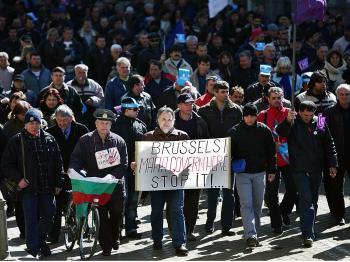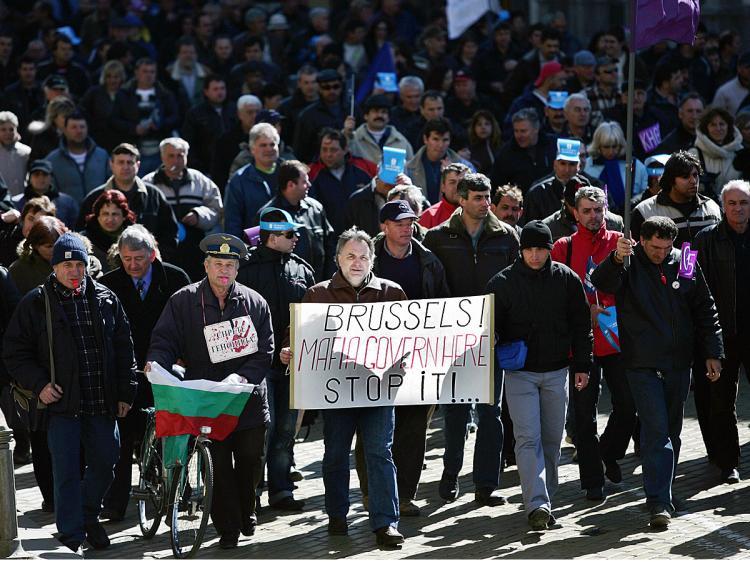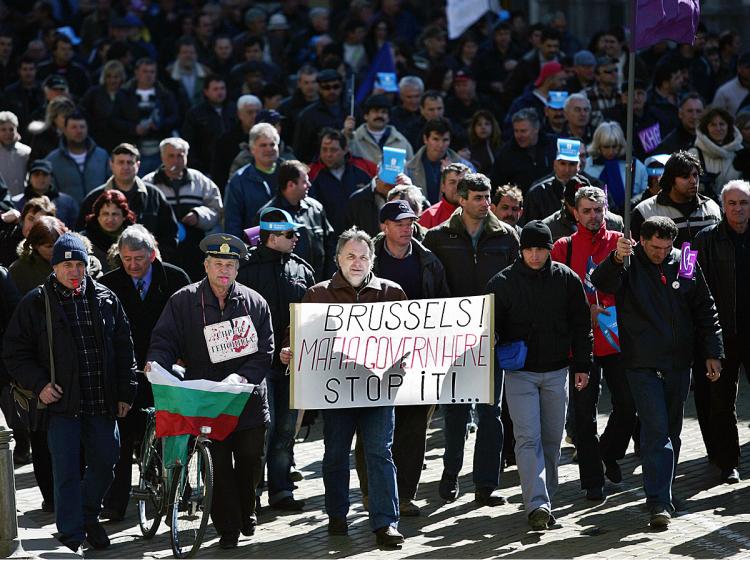Bosnia—Bosnia’s Muslim-Croat parliament cancelled a session on Feb. 26 rather than confront protesters complaining about plans to cut benefits to narrow a big budget gap.
Britain—British workers held a series of protests at power plants against the use of foreign contractors on critical energy sites. They voted to end strikes on Feb. 5 after Total agreed to hire more British workers at its Lindsey oil refinery.
Bulgaria—Hundreds of workers at Bulgaria’s Kremikovtzi steel mill protested on March 9 over planned lay-offs and unpaid salaries, demanding the Socialist-led government find a buyer for the insolvent plant.
Thousands of police officers marched in Sofia on Sunday to demand a 50 percent wage rise and better working conditions.
Czech Republic—Thousands of farmers from the Czech Republic, Germany, Austria, Slovakia, Slovenia and Poland marched through Prague on March 12 to demand higher milk prices and subsidies to boost incomes hit by the economic crisis.
France—Up to 2.5 million people demonstrated around France on Jan. 29 over pay and job protection. On March 5, unions and authorities signed a deal to end a six-week general strike over wages and prices that had paralysed France’s Caribbean island of Guadeloupe. A union leader was killed, shops were burned and looted in the protests.
—Thousands of workers marched in France’s Indian Ocean territory La Reunion on March 5 and on March 10 in a campaign of strikes and protests to push for wage increases.
—France’s eight union federations have called for a day of action on March 19 to demand government and business do more to protect jobs and salaries during the economic crisis.
Germany—15,000 Opel workers from Germany rally on Feb. 26 at the German HQ of their struggling company, demanding parent General Motors scrap plans for plant closures in Europe.
Greece—The fatal police shooting of a 15-year old in December sparked the country’s worst riots in decades, fuelled by anger at economic hardships and youth unemployment. Anarchists and left wing guerrilla groups have followed up with a wave of attacks against banks and police.
—Greek unions, representing about 2.5 million workers, have also staged repeated protests against the government saying its measures to tackle the global crisis only burden the poor.
—More than 1,000 leftist unionists marched through Athens on March 17 to demand protection of workers’ rights.
Hungary—Police used teargas to disperse anti-government protesters in Budapest March 15 and detained 35 people.
Ireland—Nearly 100,000 people marched through Dublin on Feb. 21 to protest at government cutbacks.
Latvia—A new Latvian prime minister was appointed on Feb. 26 after coalition government collapsed, the second to succumb to the financial crisis after Iceland. The agriculture minister quit on Feb. 3 after protests by farmers over falling incomes.
Lithuania—Police fired teargas on Jan. 16 to disperse demonstrators who pelted parliament with stones in protest at social spending cuts. Prime Minister Andrius Kubilius vowed to press on with an austerity plan.
Montenegro—Aluminium workers on Feb. 9 demanded to be paid and an immediate resumption of suspended production at the Kombinat Aluminijuma Podgorica, a Russian-owned plant.
Poland—Up to 10,000, mostly arms industry workers demonstrated on March 6 against lay-offs after Poland announced defence budget cuts. In Gdansk, 3,000 workers protested against power producer Energa’s job cut plans.
Portugal - Tens of thousands of workers marched in Lisbon on March 13 against the policies of the Socialist government, which unions say are increasing unemployment and favouring the rich.
Russia—About 1,000 demonstrators urged the government to resign during a peaceful march in Vladivostok on March 15. About 800,000 Russians lost their jobs in December and January, taking the total unemployed to more than 6 million, or 8.1 percent of the workforce.
Sixteen steelworkers at ESTAR’s Zlatoust steel mill, suspended a hunger strike over wages on March 14 after management agreed to some demands.
Ukraine - Hundreds of Ukrainians protested on Feb. 23, some urging President Viktor Yushchenko to quit, others demanding their money back from banks hit by the financial crisis.







